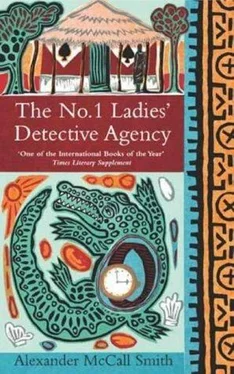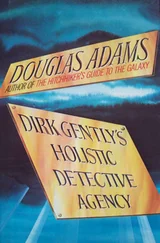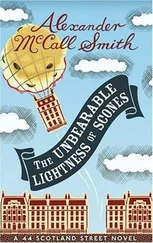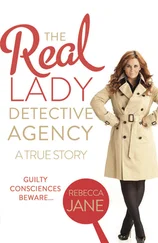"I'm sorry to say that there has been an accident. Happy was run over and is very sick at the hospital. Even now they are performing a big operation on her."
The Daddy let out a wail. "Aiee! My daughter! My little baby Happy!"
A good actor, thought Mma Ramotswe, unless… No, she preferred to trust Happy Bapetsi's instinct. A girl should know her own Daddy even if she had not seen him since she was a baby.
"Yes," she went on. "It is very sad. She is very sick, very sick.
And they need lots of blood to make up for all the blood she's lost."
The Daddy frowned. "They must give her that blood. Lots of blood. I can pay."
"It's not the money," said Mma Ramotswe. "Blood is free. We don't have the right sort. We will have to get some from her family, and you are the only one she has. We must ask you for some blood."
The Daddy sat down heavily.
"I am an old man," he said.
Mma Ramotswe sensed that it would work. Yes, this man was an impostor.
"That is why we are asking you," she said. "Because she needs so much blood, they will have to take about half your blood. And that is very dangerous for you. In fact, you might die."
The Daddy's mouth fell open.
"Die?"
"Yes," said Mma Ramotswe. "But then you are her father and we know that you would do this thing for your daughter. Now could you come quickly, or it will be too late. Doctor Moghile is waiting."
The Daddy opened his mouth, and then closed it.
"Come on," said Mma Ramotswe, reaching down and taking his wrist. "I'll help you to the van."
The Daddy rose to his feet, and then tried to sit down again. Mma Ramotswe gave him a tug,
"No," he said. "I don't want to."
"You must," said Mma Ramotswe. "Now come on."
The Daddy shook his head. "No," he said faintly. "I won't. You see, I'm not really her Daddy. There has been a mistake."
Mma Ramotswe let go of his wrist. Then, her arms folded, she stood before him and addressed him directly.
"So you are not the Daddy! I see! I see! Then what are you doing sitting in that chair and eating her food? Have you heard of the Botswana Penal Code and what it says about people like you? Have you?"
The Daddy looked down at the ground and shook his head.
"Well," said Mma Ramotswe. "You go inside that house and get your things. You have five minutes. Then I am going to take you to the bus station and you are going to get on a bus. Where do you really live?"
"Lobatse," said the Daddy. "But I don't like it down there."
"Well," said Mma Ramotswe. "Maybe if you started doing something instead of just sitting in a chair you might like it a bit more. There are lots of melons to grow down there. How about that, for a start?"
The Daddy looked miserable.
"Inside!" she ordered. "Four minutes left now!"
WHEN HAPPY Bapetsi returned home she found the Daddy gone and his room cleared out. There was a note from Mma Ramotswe on the kitchen table, which she read, and as she did so, her smile returned.
THAT WAS not your Daddy after all. I found out the best way. I got him to tell me himself. Maybe you will find the real Daddy one day. Maybe not. But in the meantime, you can be happy again.
ALL THOSE YEARS AGO
WE DON'T forget, thought Mma Ramotswe. Our heads may be small, but they are as full of memories as the sky may sometimes be full of swarming bees, thousands and thousands of memories, of smells, of places, of little things that happened to us and which come back, unexpectedly, to remind us who we are. And who am I? I am Precious Ramotswe, citizen of Botswana, daughter of Obed Ramotswe who died because he had been a miner and could no longer breathe. His life was unrecorded; who is there to write down the lives of ordinary people?
I AM Obed Ramotswe, and I was born near Mahalapye in 1930. Mahalapye is halfway between Gaborone and Francis-town, on that road that seems to go on and on forever. It was a dirt road in those days, of course, and the railway line was much more important. The track came down from Bulawayo, crossed into Botswana at Plumtree, and then headed south down the side of the country all the way to Mafikeng, on the other side.
As a boy I used to watch the trains as they drew up at the siding. They let out great clouds of steam, and we would dare one another to run as close as we could to it. The stokers would shout at us, and the station master would blow his whistle, but they never managed to get rid of us. We hid behind plants and boxes and dashed out to ask for coins from the closed windows of the trains. We saw the white people look out of their windows, like ghosts, and sometimes they would toss us one of their Rhodesian pennies-large copper coins with a hole in the middle-or, if we were lucky, a tiny silver coin we called a tickey, which could buy us a small tin of syrup. Mahalapye was a straggling village of huts made of brown, sun-baked mud bricks and a few tin-roofed buildings. These belonged to the Government or the Railways, and they seemed to us to represent distant, unattainable luxury. There was a school run by an old Anglican priest and a white woman whose face had been half-destroyed by the sun. They both spoke Setswana, which was unusual, but they taught us in English, insisting, on the pain of a thrashing, that we left our own language outside in the playground.
On the other side of the road was the beginning of the plain that stretched out into the Kalahari. It was featureless land, cluttered with low thorn trees, on the branches of which there perched the hornbills and the fluttering molopes, with their long, trailing tail feathers. It was a world that seemed to have no end, and that, I think, is what made Africa in those days so different. There was no end to it. A man could walk, or ride, forever, and he would never get anywhere.
I am sixty now, and I do not think God wants me to live much longer. Perhaps there will be a few years more, but I doubt it; I saw Dr Moffat at the Dutch Reformed Hospital in Mochudi who listened to my chest. He could tell that I had been a miner, just by listening, and he shook his head and said that the mines have many different ways of hurting a man. As he spoke, I remembered a song which the Sotho miners used to sing. They sang: "The mines eat men. Even when you have left them, the mines may still be eating you." We all knew this was true. You could be killed by falling rock or you could be killed years later, when going underground was just a memory, or even a bad dream that visited you at night. The mines would come back for their payment, just as they were coming back for me now. So I was not surprised by what Dr Moffat said.
Some people cannot bear news like that. They think they must live forever, and they cry and wail when they realise that their time is coming. I do not feel that, and I did not weep at that news which the doctor gave me. The only thing that makes me sad is that I shall be leaving Africa when I die. I love Africa, which is my mother and my father. When I am dead, I shall miss the smell of Africa, because they say that where you go, wherever that may be, there is no smell and no taste.
I'm not saying that I'm a brave man-I'm not-but I really don't seem to mind this news I have been given. I can look back over my sixty years and think of everything that I have seen and of how I started with nothing and ended up with almost two hundred cattle. And I have a good daughter, a loyal daughter, who looks after me well and makes me tea while I sit here in the sun and look out to the hills in the distance. When you see these hills from a distance, they are blue; as all the distances in this country are. We are far from the sea here, with Angola and Namibia between us and the coast, and yet we have this great empty ocean of blue above us and around us. No sailor could be lonelier than a man standing in the middle of our land, with the miles and miles of blue about him.
Читать дальше












